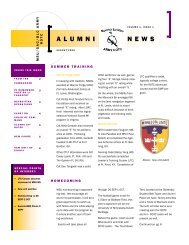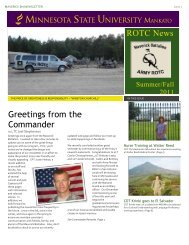Winter 2012 Partnership Magazine - College of Education Home ...
Winter 2012 Partnership Magazine - College of Education Home ...
Winter 2012 Partnership Magazine - College of Education Home ...
You also want an ePaper? Increase the reach of your titles
YUMPU automatically turns print PDFs into web optimized ePapers that Google loves.
if a student can make one strong connection with someone in the<br />
school, even if it is the janitor or the cook, they are more likely to<br />
be successful.<br />
We all need to laugh more. I believe that a sense <strong>of</strong> humor<br />
is essential to be a teacher. You need to have some fun with the<br />
kids. Yes, I know there are those who say, I am not paid to have<br />
fun with the kids, or I am not paid to entertain. But kids respond<br />
to humor, they like it when the teacher is smiling and appears to<br />
enjoy what they are doing. They know if you like your job or not.<br />
Humor can diffuse situations that might otherwise escalate into<br />
Mankato<br />
Kay Green<br />
Effective, successful teachers believe that every<br />
student has the ability to learn. It is the strategies we utilize<br />
within our curricula, combined with our understanding<br />
<strong>of</strong> pedagogy, and the talent we possess in the “art <strong>of</strong><br />
teaching” that provides us the ability to move each student<br />
along their personal continuum <strong>of</strong> learning.<br />
Some <strong>of</strong> the ideals and practices that I use to assist<br />
me in assuring both academic growth and personal<br />
confidence in students are as follows:<br />
• Read the face <strong>of</strong> your students.<br />
• Regularly revisit the effectiveness <strong>of</strong> your listening skills.<br />
• Be consistent, do not say it if you are not willing to follow<br />
through with it.<br />
• Call parents for positive reasons.<br />
• Study your curriculum lesson and move away from the manual.<br />
• Share a part <strong>of</strong> your true person with your students.<br />
• Admit to learning with the students and not always being<br />
correct.<br />
• Keep true to the fidelity <strong>of</strong> your district’s curriculum…put your<br />
personality into the presentation <strong>of</strong> it.<br />
• When frustrated or aggravated, think outside the box.<br />
Laura Linde<br />
Effective educators believe what is heard, observed,<br />
and experienced firsthand versus adopting and acting on<br />
the thoughts, opinions, and perspectives <strong>of</strong> others. Acting<br />
on assumptions closes the mind that independent thinking<br />
can open.<br />
Be reflective in your practice. Reflect on lessons<br />
taught, experiences that are provided, and interactions<br />
and responses during and throughout the day. Genuine<br />
and candid reflection is the key to effectively improved teaching and<br />
practice.<br />
Focus on life’s design with relevant, creative, and purposeful<br />
learning so students know and understand that education and<br />
learning are a continuous journey.<br />
Be a leader. Volunteer to help out and share the load if you note<br />
others having a high volume <strong>of</strong> challenges. If you help design the rules<br />
and policies, set the example to model and follow the team decision.<br />
Admit mistakes, learn from them, and move on.<br />
Teach students where to find information and resources and<br />
how to evaluate information resources so they become autonomous<br />
learners and effective decision makers.<br />
Build in the element <strong>of</strong> surprise whenever possible. This keeps<br />
students interested and adds an element <strong>of</strong> joyful learning to<br />
<strong>Winter</strong> <strong>2012</strong> <strong>Partnership</strong><br />
problems. Having fun does not mean that you do not take your<br />
job as a teacher very seriously.<br />
We never stop learning new things. If you believe that when<br />
you graduate from college you know everything you need to know<br />
for a career in teaching, you are wrong. Every year I have taught<br />
I have challenged myself to learn new things, take a class, teach<br />
a new way, read a book, ask a question, or absolutely jump into<br />
a new initiative. It has never been truer than it is today, kids are<br />
changing, and we need to change with them. Learn something<br />
new today, and have fun doing it.<br />
• Walk away from judgmental, gossipy, unproductive<br />
conversations with colleagues.<br />
• Change something you have done in the past.<br />
• Communicate, communicate, and communicate.<br />
• Read the body language <strong>of</strong> your students.<br />
• Work hard, be dedicated, be confident and then be<br />
proud.<br />
• Make clear expectations a part <strong>of</strong> every lesson,<br />
procedure, and action.<br />
• At all age levels, set the expectation bar high for your<br />
students, it is natural for them to reach for it.<br />
• Ask questions <strong>of</strong> the students, the educational process,<br />
and <strong>of</strong> yourself.<br />
• Work ahead, be over prepared, and make a list.<br />
• Accept that the need to be flexible is a constant.<br />
• Play with your class.<br />
• Do not tolerate harassment in any degree.<br />
• Celebrate the success <strong>of</strong> each student’s personal best.<br />
• And again, read the face <strong>of</strong> your students and adjust.<br />
On these ideals I base my personal framework for effective<br />
teaching and use as the foundation for my philosophy <strong>of</strong> educating<br />
students.<br />
everyone’s day.<br />
Strive for pr<strong>of</strong>essionalism that focuses on what is<br />
best for many versus a select few and err on the side <strong>of</strong><br />
inclusion versus exclusion in all that you do.<br />
When planning lessons, clearly state the purpose<br />
<strong>of</strong> the lesson and share that purpose with the students.<br />
Create examples <strong>of</strong> purpose that utilize humor, story<br />
telling or real life events to which students can relate.<br />
Use formative and summative assessment as an<br />
indicator <strong>of</strong> what students know and are able to do. Use<br />
assessment for learning and <strong>of</strong> learning in your planning.<br />
Place the assessment in the forefront <strong>of</strong> your planning. This will help<br />
you to identify and clarify where you are headed with your objectives<br />
and outcomes. Like headlights on a vehicle, it will help guide the<br />
learning journey.<br />
Celebrate the students’ successes and your successes.<br />
Celebrations are motivational to students and inspire students to want<br />
to do better. Be inspirational in what you say and do!<br />
Teach students that both independence and interdependence are<br />
critical in an ever-changing world. We all have a shared responsibility<br />
to use strengths and talents to the best <strong>of</strong> our ability. The element <strong>of</strong><br />
reciprocity exists within each one <strong>of</strong> us. As we teach, guide, and<br />
facilitate, we learn from others as much as others learn from us.<br />
23




